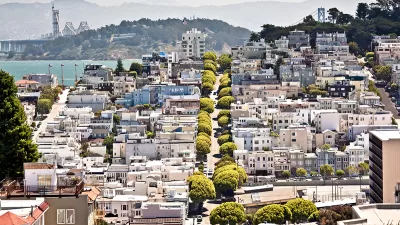Despite the pro-infill position of the Sierra Club's national organization, San Francisco's branch advocates to preserve the buildings that are currently there at the expense of density and subsidized housing.

"The national Sierra Club promotes infill development because they know that dense, urban environments result in less greenhouse gas emissions than urban sprawl," Andy Lynch reports in The Bay City Beacon. But, when Lynch attended a meeting of the club he found the local branch advocating the preservation of a "historic garage"—not on the basis of a positive environmental impact so much as a move to stop the development that might take its place.
The club also heard from activist Calvin Welch, who spoke out against relaxing zoning laws and allowing for more density in exchange for more subsidized housing. "For a club that sees themselves as progressive, it is ironic that they are such strong advocates for strict zoning rules, a practice rooted in racism and designed to segregate neighborhoods," Lynch argues. When trying to understand this apparent inconsistency he lands on keeping out potentially conservative voters as the most likely motivation. After hearing Mr. Welch comment, "who lives here is who votes here."
Lynch argues, "That’s the ballgame. Why does the Sierra Club fight tooth and nail to stop developments, including blocking the affordable housing they claim to advocate for? They’re afraid that new housing means new residents who might not agree with their politics."
FULL STORY: The Sierra Club Fights to Save...A Parking Garage?

Planetizen Federal Action Tracker
A weekly monitor of how Trump’s orders and actions are impacting planners and planning in America.

Restaurant Patios Were a Pandemic Win — Why Were They so Hard to Keep?
Social distancing requirements and changes in travel patterns prompted cities to pilot new uses for street and sidewalk space. Then it got complicated.

Map: Where Senate Republicans Want to Sell Your Public Lands
For public land advocates, the Senate Republicans’ proposal to sell millions of acres of public land in the West is “the biggest fight of their careers.”

Maui's Vacation Rental Debate Turns Ugly
Verbal attacks, misinformation campaigns and fistfights plague a high-stakes debate to convert thousands of vacation rentals into long-term housing.

San Francisco Suspends Traffic Calming Amidst Record Deaths
Citing “a challenging fiscal landscape,” the city will cease the program on the heels of 42 traffic deaths, including 24 pedestrians.

California Homeless Arrests, Citations Spike After Ruling
An investigation reveals that anti-homeless actions increased up to 500% after Grants Pass v. Johnson — even in cities claiming no policy change.
Urban Design for Planners 1: Software Tools
This six-course series explores essential urban design concepts using open source software and equips planners with the tools they need to participate fully in the urban design process.
Planning for Universal Design
Learn the tools for implementing Universal Design in planning regulations.
Heyer Gruel & Associates PA
JM Goldson LLC
Custer County Colorado
City of Camden Redevelopment Agency
City of Astoria
Transportation Research & Education Center (TREC) at Portland State University
Camden Redevelopment Agency
City of Claremont
Municipality of Princeton (NJ)



























